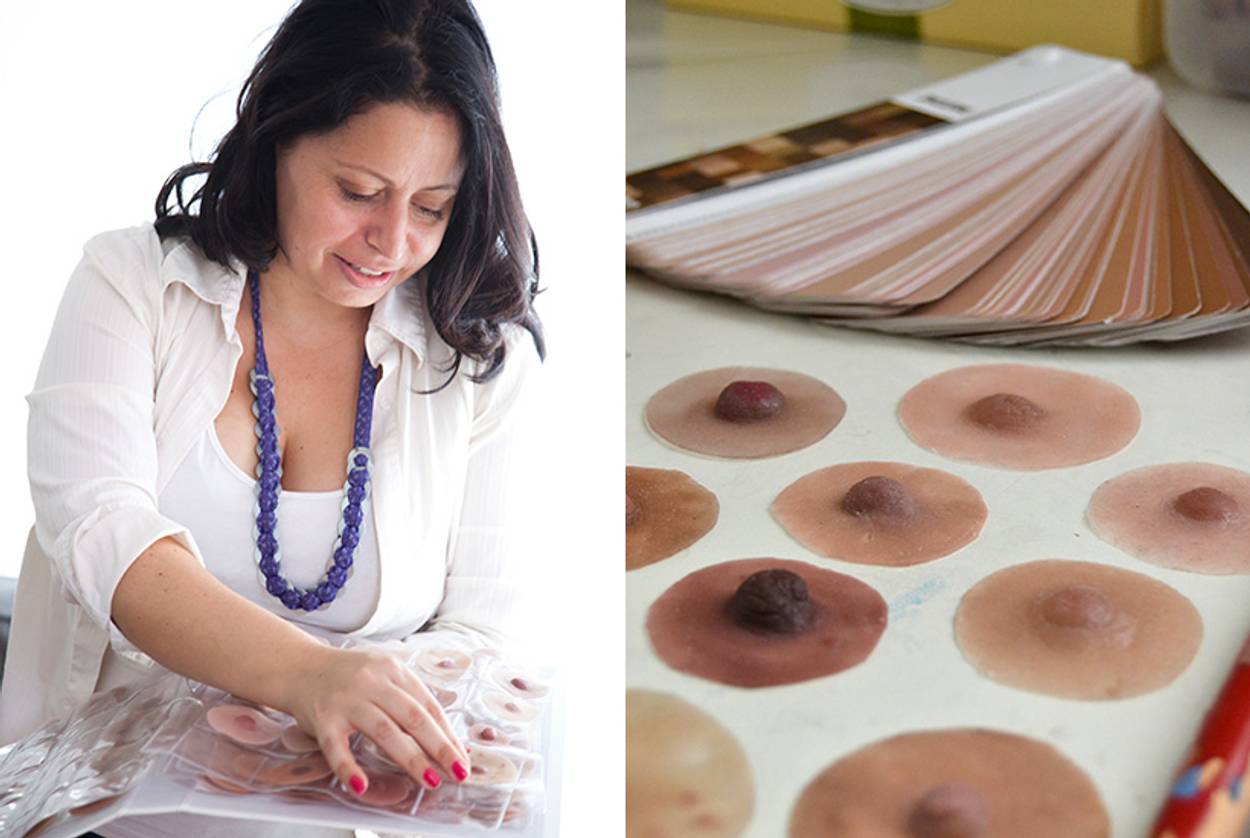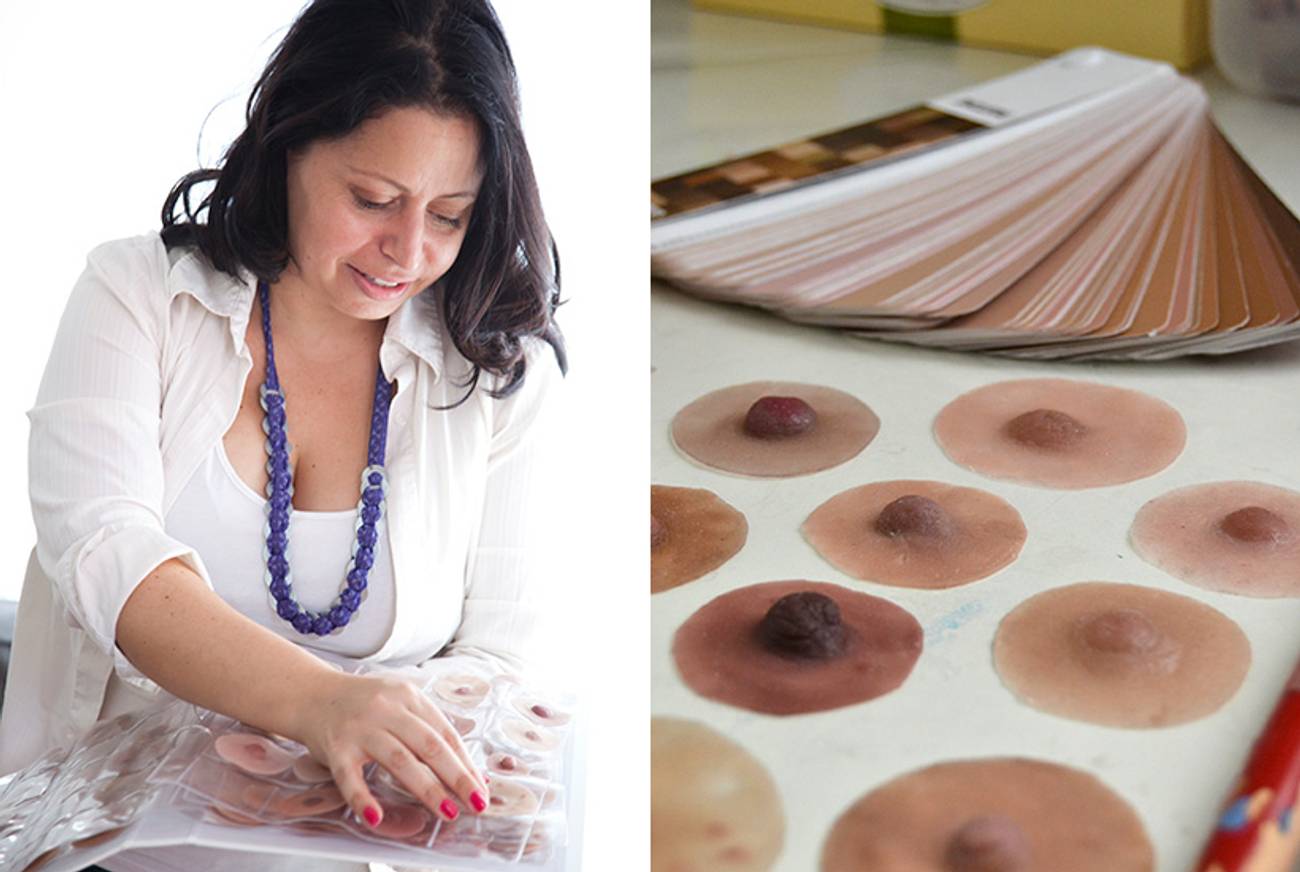Breast Cancer Survivor Michelle Arbel Helps Other Survivors Feel Whole Again
The Israeli entrepreneur’s prosthetic nipples allow women to regain confidence in their appearance and avoid additional surgery




Michelle Arbel is traveling this week from her home in Israel to Walt Disney World in Orlando, Fla. But this 37-year-old wife and mother won’t be riding the Matterhorn with her son or posing for photos with Cinderella. Instead, she’ll be attending a conference held in a Walt Disney World resort hotel this weekend for young women affected by breast cancer. There she’ll try to drum up interest in her nipples—her prosthetic nipples, which she produces for other breast cancer survivors like herself.
Arbel is the owner of Pink Perfect, a company she founded in 2010, just two years after her own diagnosis, to provide a more natural nipple prosthesis for women who have had breast reconstruction following mastectomy. Over 200 Israeli and American women, as well as leading plastic surgeons, have discovered what Arbel knew instinctively: Only a breast cancer survivor who wore a nipple prosthesis herself was capable of creating a prosthesis that could make other women feel like themselves again.
In 2013, Arbel was named Israeli Entrepreneur of the Year by the Keren Shemesh Foundation, a philanthropic organization whose aim is to assist young entrepreneurs in establishing their first business. “She leveraged her own hardship,” said Keren Shemesh CEO Michal Even-Chen, “and created a solution for other women facing mastectomy.”
Beyond the awards and professional success, what motivates Arbel is her contact with other young breast cancer survivors: “When I meet fellow breast cancer survivors, we share a lot of laughter,” she said. “But it’s laughter that comes from pain.”
She’ll have a chance to connect with over 1,000 fellow survivors in Orlando at the fourth annual C4YW conference, Feb. 21-23. C4YW provides a forum for breast cancer survivors under 45 to learn from each other and respected healthcare professionals. The gathering will feature speakers from Harvard Medical School, UCLA, and the Mayo Clinic, as well as a variety of workshops—Confronting Mortality at a Young Age, Sex and Intimacy, Single & Dating—including one of particular interest to Jewish women: Genetic and Hereditary Risk. Ten percent of Ashkenazi women carry BRCA1 or BRCA2, gene mutations that cause breast cancer, which increases their risk by 45 percent to 65 percent. This year, 70,000 men and women under 45 will be diagnosed with breast cancer in the United States alone.
Arbel will be in her element at the conference: “I want to change the lives of women and help them feel whole again,” she said.
***
Arbel never planned to do what she’s now doing. Born in Arad near the Dead Sea, she completed her army duty and then pursued a degree in communications. After working at an ad agency, she moved with her husband to New York City, where he completed his MBA and she continued her studies at NYU. Along the way, their son Etay was born. When the family returned to Israel, Arbel wanted to get pregnant again. But she got the news from her doctor: There was a malignant lump in her breast, and her glands had also been affected. The recommended course of action: mastectomy, followed by chemotherapy.
Arbel was shocked. She had no family history of breast cancer and led a healthy lifestyle; she had breastfed for one year and didn’t go in the sun. She held an impromptu conversation with “the guy upstairs,” she told me: I fucking have cancer? Are you kidding? What have I done that’s so bad? Why me?
“While driving in my car, I screamed so loud I could hear my voice bounce against the windshield and echo back to me,” she said. “I screamed and punched the wheel at the emotional strain I was placing on my family, my friends, my husband.” Working through all the stages of bereavement, from anger to acceptance, Arbel vented her feelings on her blog— Carcinoma, My Love—on CureDiva.
She then turned to a young breast cancer survivor whose son was in Etay’s kindergarten class. “She asked what scared me the most,” said Arbel. “I told her I was afraid of being bald, the scars, and losing my femininity.” Her friend replied: “Funny, women are more concerned about these things than the cancer itself.” She told Arbel that surviving breast cancer was a war, a subject Israelis know all too well. “You will win,” her friend said, “But there will be several battles and, if you fall, you have people who will help you get back up.”
Arbel went through 16 chemo sessions, plus biological and hormonal treatments. Then, in 2010, she had a unilateral mastectomy. Following reconstructive surgery, she looked in the mirror and didn’t like what she saw: “My breast was reconstructed without a nipple. I was told I would have to wait several months for the next phase of surgery and none of the existing nipple prostheses looked natural. I tried them all. Some looked great in photos but they felt plasticky. And the color was not accurate compared to my own nipples.”
Arbel was determined, impatient, and inspired. “I did intensive training with a professional silicone artist and, through trial and error, learned how to make my own nipple prosthesis,” she said. It wasn’t an easy task for a woman with no engineering or medical background. Using a mold that replicated the exact shape, size, and color of her remaining nipple, Arbel created a prosthesis that looked natural and could be worn in the shower or swimming pool. It was a major improvement on available nipple prosthesis; it was thinner and gave a more natural appearance. Arbel got her self-confidence back; she was able to dress and undress without having to worry that something was missing. “I could wear bathing suits again and share intimate moments again,” said Arbel. “I was so thrilled, I decided not to undergo nipple reconstructive surgery.”
Instead, she continues to wear the prosthetic nipple, which is held in place by a surgical adhesive that lasts up to two weeks and isn’t affected by exercise or showering. “I’m the only breast cancer survivor who makes this kind of product and actually uses it on a daily basis,” she said.
Arbel set up a workshop in her home in Kfar Saba and, working with leading Israeli plastic surgeons, started making nipple prostheses for other breast cancer survivors. Her husband designed her website, and Pink Perfect was launched. Dr. Eran Bar Meir, chief of plastic surgery at Poria Medical Center near Tiberias, is enthusiastic about Arbel’s product. “Pink Perfect is an amazing solution,” he said, “by far, the best I have seen. I have numerous patients who use the product and recommend it to their friends.”
Word spread fast. Soon, Arbel was hearing from women in the United States and needed to find a way to respond. She created two options: ready-made prostheses and a made-to-order kit with an easy-to-use mold that replicates the exact shape and size of the nipple, along with a color chart. The kit eliminates the need for customers to travel to Arbel’s workshop in Israel and expands her reach to a global market. “Some women contact us right before or after their mastectomy, but others come to us years after their reconstructive surgery because they are still seeking a solution,” she said.
The prosthetic nipples are also a much less invasive and expensive alternative to surgery. Suzanne, a 55-year-old American living in Israel who requested her last name not be used, had a double mastectomy and breast reconstruction three months ago. She discovered that nipple reconstruction—a separate surgical operation scheduled months after breast reconstruction—can be a difficult ordeal. “Nobody tells you that it’s a painful surgical procedure,” she said, “plus a tattoo that needs to be re-done very few years because the color wears off.” Fortunately, she learned about Pink Perfect before her mastectomy from Dr. Haim Kaplan, a leading Israeli plastic surgeon. “I went into surgery feeling strong and confident because I knew my personalized prostheses in their little pink box were going to help me become myself again.”
Suzanne was so happy, she decided not to have surgical nipple reconstruction: “I felt whole and attractive again. I would duck out to the bathroom mirror throughout the day and lift my shirt because I couldn’t believe how good I looked,” she said. “Psychologically, these silicone nipples helped me to heal emotionally.”
***
You can help support Tablet’s unique brand of Jewish journalism. Click here to donate today.
Stacia Friedman is a Philadelphia-based freelance writer.
Stacia Friedman is a Philadelphia-based freelance writer.